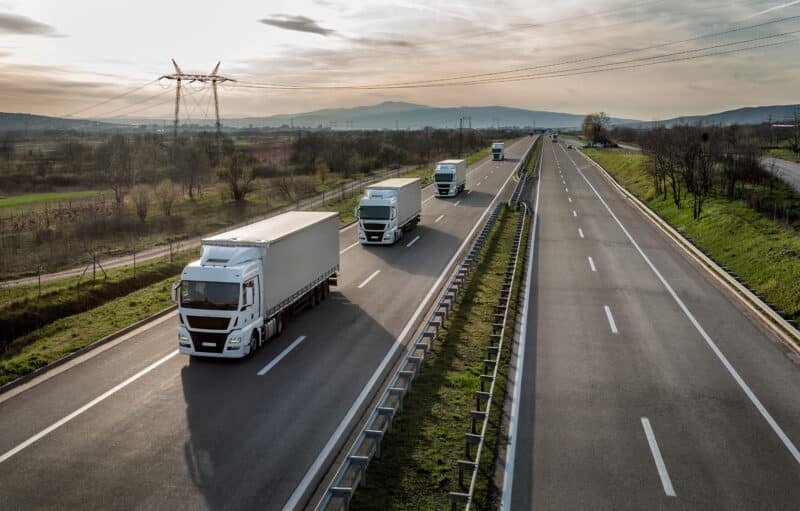Effective from December 1, 2023, Germany, as the first country in the European Union, has increased road toll rates. This decision is in response to the Union’s regulations from 2022. The implementation of these regulations by the member states by March 2024 has turned Germany into the forerunner in adapting to the new policy. Hungary and Austria have also decided to raise their rates. How do these changes affect the transport industry?
In October 2023, the German Federal Parliament responded to the growing challenges associated with CO₂ emissions and was the first to adopt an innovative plan concerning road tolls. The new regulations entail the introduction of a doubled rate for heavy vehicles with a Euro 6 engine. These charges are tied to the emission of CO₂. The first part is based on the CO₂ efficiency of a given vehicle, which refers to the amount of emitted carbon dioxide relative to its performance. The second part takes additional external costs associated with CO₂ emissions into account, including the impact on the environment and public health.
New regulations for old and new cars
In addition to doubling the rates for Euro VI trucks, the increase will also cover owners of eco-friendly gas vehicles – CNG and LNG. Electric vehicles will not be exempt from these charges, despite being environmentally friendly. This move to maintain charges for electric vehicles is controversial, particularly in line with efforts to combat CO₂ emissions.
“Why should electric vehicles also be subject to charges – especially when the cost of purchasing such cars is significantly higher? The investment in electric vehicles was supposed to help avoid additional fees. And finally, where does such a drastic increase in the case of combustion engine vehicles come from? These critical questions require in-depth discussion.” says Maciej Maroszyk, the Operational Director of TC Legal Counsel.
Additional Challenges for Electromobility
The elimination of subsidies for electric cars in Germany last year has resulted in a significant decline in interest in these vehicles. Although there is currently no problem with their availability, the situation may change drastically. An expert from TC Legal Counsel points out that if a quick fleet replacement does not begin, we could face a shortage later on.
“Another challenge is the ongoing lack of progress in developing infrastructure for electric vehicles in Poland. This is despite our road network being comparatively new and considered one of the best in Europe,” explains the Operational Director from TC Legal Counsel.
Counting Emissions
As the infrastructure facilitating zero-emissions vehicles develops, anticipated legislative changes promoting ecological solutions in transport are expected. One such change concerns the calculation of CO₂ and other gas emissions for individual vehicles.
“Counting emissions in the transport sector is an important, forward-looking step towards sustainable development. For this reason, the IRU has gladly accepted the Council’s agreement on the well-to-wheel approach. Nevertheless, there are certain uncertainties, especially in the treatment of subcontracting and common practices in road transport. Additionally, there are uncertainties regarding the costs and bureaucracy that these new calculations could impose on transportation operators. The proposal of CountEmissions EU, part of the European Commission’s ‘Green Cargo Package,’ aims to introduce common EU frameworks for calculating and disclosing greenhouse gas emissions related to passenger and cargo transportation. It is encouraging that the Council supported the Commission’s approach and adapted the CountEmissions EU proposal to the ISO 14083 standard, which already exists and offers a calculation methodology based on the well-to-wheel system,” explains the Operational Director of TC Legal Counsel.
Disruptions in the Transport Sector
Road tolls must increase across the entire European Union by 2025. Unfortunately, if the implementation time for new regulations is too short, transport companies will face major challenges. Raising road tolls in such a short time creates difficulties, especially for transport operators, who must adapt their existing contracts containing only fuel clauses. Road toll increases can also affect retail prices, both inside and outside Germany. Therefore, other member states should provide enough time for the implementation of higher road toll rates, enabling the transportation, freight forwarding, and logistics industry to adapt to the new situation.
A New Reality for TSL (Transport, Shipping, Logistics)
The changes in road tolls introduce a new reality for the transport industry. The rate increases will be most noticeable to carriers, who will be responsible for settling these charges.
The efficient management of funds obtained from road tolls will also be a challenge. The adjustment of toll systems to new environmental standards was supposed to encourage further innovations in eco-friendly transport, while ensuring sustainable and efficient funding for transport infrastructure.
“In the context of road tolls, new justifications for potential increases will emerge in the coming years. These changes can stem from various factors, such as rising road infrastructure maintenance costs, the need for financing modernization projects, or the aim for sustainable transport development. Monitoring these evolutions will become essential for understanding the direction of road toll policies, and adapting to eventual new challenges for the transport industry,” concludes Maciej Maroszyk from TC Legal Counsel.
